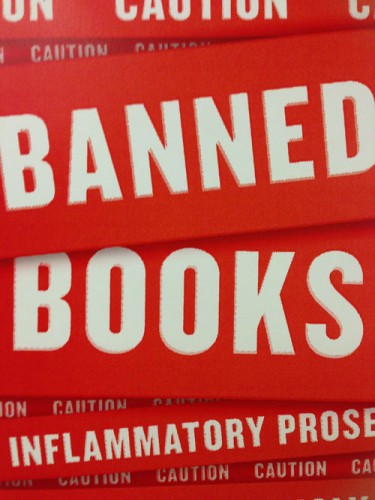On September 27, as Ooligan students packed their book bags for the first day of fall classes, publishers, bookstores, schools, and libraries around the country were gearing up for the thirty-third annual Banned Books Week. Begun in 1982 as a campaign against attempts to remove or restrict access to books, Banned Books Week has grown into a national—even international—celebration of the freedom to read.
As September gave way to October, the book community came together to draw attention to the dangers of censorship by posting with the #BannedBooksWeek hashtag, staging “read-outs,” launching free giveaways of famous banned books, and in the case of Portland’s own Powell’s Books, hosting a discussion with free-speech lawyer Duane Bosworth on “Censorship and the First Amendment.” All this advocacy for open access comes from a firm conviction among publishers, booksellers, teachers, librarians, and readers that creative expression and critical thinking are stifled when books are forbidden.

Powell’s brought out banned books in celebration of inflammatory prose
But in today’s modern age of information, are books really under threat? While it may come as no surprise that such scandalous titles as D. H. Lawrence’s Lady Chatterley’s Lover, James Joyce’s Ulysses, and even Harper Lee’s beloved To Kill a Mockingbird were once widely banned (for an interactive timeline, see the American Library Association’s “Banned Books Week: Celebrating Thirty Years of Liberating Literature” infographic), many readers would be shocked to learn that even in Oregon, where people pride themselves on open-mindedness, Sherman Alexie’s National Book Award-winning The Absolutely True Diary of a Part-Time Indian was challenged just this year in Sweet Home’s eighth-grade language arts classes “because of its use of words not allowed by the student code of conduct and its discussion of sexual matters.”
Alexie’s important and provocative young adult novel also tops the ALA’s list of most-challenged books in 2014. The ALA tracks requests to restrict or remove titles in libraries and schools but estimates that for every recorded challenge, four or five incidents go unreported. It is joined on the ALA’s list by Khaled Hosseini’s celebrated The Kite Runner and even The Bluest Eye by distinguished author Toni Morrison, whose literary honors include the 1993 Nobel Prize and the 2012 Presidential Medal of Freedom.
For those of us who prefer to make up our own minds about what’s worth reading, Quirk Books is helping readers celebrate banned books all year long with printable cautions, like “WARNING: Contents May Cause You to Question Your Worldview.” But for freethinkers who value the right to read dangerously, maybe attempts at banning aren’t all bad—after all, as one Powell’s attendee pointed out, “Without banned books, how would I know what to read?”

